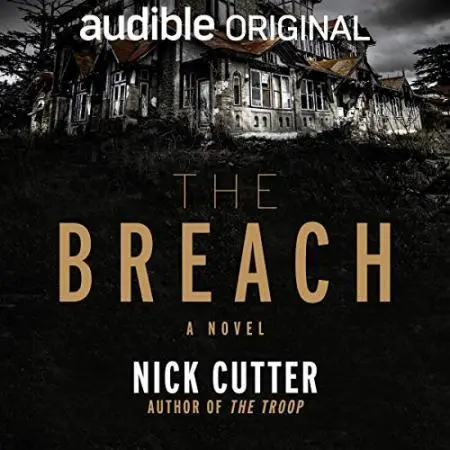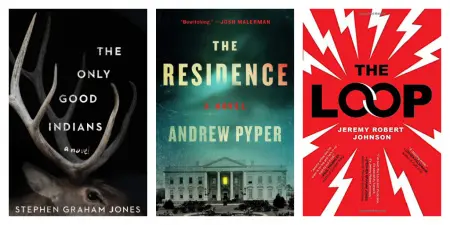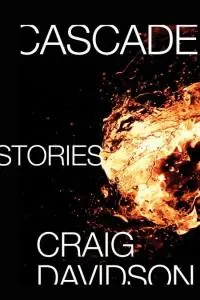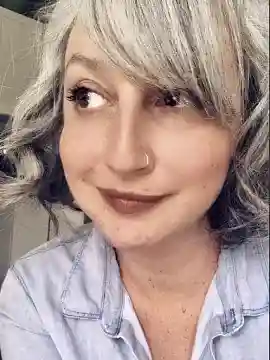Photo courtesy of the author
My first Nick Cutter book was, The Deep. In my Goodreads review I wrote, "I don't even know what all to say right now.*Shell shocked*. This book is a mind bending, psychological, claustrophobic descent into the deep, dark (evil) abyss that lies at the bottom of the ocean. Never go to the bottom of the ocean. Cutter reels you in slowly, a bit at a time, you manage to swallow some pretty foul tasting medicine but you keep going, venturing forward—and then, when you're nice and hooked in the lip—he rips you the rest of the way through the book!"
After reading absolutely everything Nick Cutter had to offer me, I moved on to his Craig Davidson books, falling in love with Cataract City and eventually finishing all of those books as well. It's my recommendation that if you're new to Craig's work, you should absolutely start with The Saturday Night Ghost Club, which I think is a sweet-spot blend of Craig's horror narrative via Nick Cutter and the storytelling vibe from his Davidson books.
I wanted to catch up with Craig Davidson to see how he navigated the storms of 2020. I appreciate Craig's brutal honesty in this interview and if you're looking for more insight, I sat down with him and Ian Rogers to talk about books and writing HERE.
Craig, your Audible exclusive release, The Breach, was released in October of 2020. Can you share with us some of the marketing strategy behind releasing that book exclusively through one platform? Are there future plans for that book to ever be released as a physical book, eBook or adapted for TV/Film?
The slightly long story is, I wrote a screenplay a few years back called The Bakaak. It was set up north here in Canada, kind of an Indigenous mythical horror. The truth was, I probably wasn’t the person to write that script (though I still did, back then). I won’t claim it was an act of appropriation, though that's not for me to say I guess. Likely there was an “Own Voices” issue I should’ve been more aware of.
A producer friend of mine submitted the script to a Canadian film funding body and, while there were significant issues noted by the reader, there was enough value for it to get some development money. So at that point I thought, “OK, before re-writing the script, I ought to write a story, or a novel, to form the base-point of the revision.” I wrote the novel and once it was done I sent it to a screenwriting friend of mine, Ian Weir. He read it and we decided to use that funding money to rewrite The Bakaak under this new framework, the novel as a template. Nothing to do with Indigenous myth, much more to do with science running amok—which evidently is an obsession of mine.
We rewrote the script and in the meantime my agent submitted the manuscript. I think, in all honesty, I didn’t quite do what I wanted to do with the book. Some books don’t quite come together the way you’d hope, and for all your tinkering (and I did, diligently, as I always do) some just don’t quite make that turn. In the end, the best offer we got for it was from Audible. There weren’t a lot of offers, to be plain. Perhaps that had something to do with the conception: an old script rewritten into a novel that went onto become another script, which itself is very different from the novel it’s based on, as scripts often are. Perhaps it was a bit of creative burnout on my part. The film itself was shot up here in Canada over the pandemic. I think it will be an excellent movie, partially as it’s different than the book. The concept was worked on a lot: the director, Rodrigo Gudino, made his own very smart changes to Ian and I’s script. It’s got a really good and inspired creative team on the production side, too. And some great actors. So I’m hopeful.

A favorite question I like to ask authors is their highs and lows. Can you do that for us now? Like maybe 5 highs for 2020 and 5 lows?
For 2020? I think for a lot of us the lows outmuscle the highs, don’t they? If we’re being honest here, right? If someone reading this managed to make 2020 the best year of their life, I can only marvel. Maybe they make PPE? My wife mentioned this phenomenon, “Toxic Positivity.” Like, trying to find the silver lining in a cloud that really doesn’t have much of one. Some things, like Covid, generally just have to be endured. I’m not comparing what we’re going through to a war, but the impact on people’s life is severe, and generally not good, so sitting there saying, “Well, we should really be thankful for this war, or this pandemic, because it adds perspective—and, I mean, do you really want to get back to your subway commute and all that stuff?” The answer is, Yes! Yes, I do. Back to the subway commute and the traffic and all of it, because all the good stuff, the elementarily and simply good stuff, roars back with it. So I guess I’m drawing a blank on highs, and the lows are just one enveloping one: Covid.
I’d say the birth of our daughter is a high, and she is—a true, marvelous high—but she was born in the final days of 2019.
Looking back over everything last year, are there any new revelations or lessons you’ve taken away from your experience? How about personally and professionally?
Um, maybe that I’m not quite the isolationist I thought I was. That I need human contact, even the almost impersonal kind (strangers’ voices at a coffee shop), more than I would have thought. And I’m really fortunate to have a great family to slog through this with. That’s been a bonus.
If someone new to the horror genre came up to you and said, “I want to get a very well rounded idea of what horror fiction has to offer, please recommend 3 books I should read from 2020 only—which books would you choose?
Oof. I’ve been derelict in my horror reading, sadly, but I did read exactly 3 horror books in 2020, released that year, so I can do this! The Only Good Indians by Stephen Graham Jones, The Residence by Andrew Pyper, and The Loop by Jeremy Robert Johnson. All excellent! There were more, and many great ones (I will read Paul Tremblay’s latest at some point, he is such a good writer, and Grady Hendrix and Alma Katsu’s are on my to-read shelf), but those are the ones I got to in 2020 that were released in 2020.

If you feel comfortable, can you share with us why you pulled away from social media a few years ago? I feel like so many authors and industry people love the idea of abandoning social media but they fear that not having a presence decreases sales due to a crippling lack of other marketing strategies. What are your thoughts on this and what does your publicity/publishing team think of this personal choice?
Oh, I suppose I just got tired of it. I’m a fairly private person, and the people who I 100% need in my life are all available to me offline, in person, or via private channels like email. I don’t have a better answer than that, really. I would assume that my publishers would rather I have an online presence, and if in future that becomes a requirement or I’m pressed to do so, I won’t fight it. It’s not like I’m dead-set against it and would scuttle an opportunity if a publisher made it a requirement. But right now, I have no book contracts other than with my longtime Canadian publisher and editor, and she/they have made no fuss over me not being on Twitter, etc. If there was a point where that request was made of me, Okay, I’d be back on. My presence might be a bit muted, but I’d be there. We all do things for the sake of our jobs, which are ultimately for the people we care about: our families, so we can do our part to provide for our household.
What are you most proud of in the last year?
Most proud of. Well, I think it’s a family pride of getting on with life as best we can with a new baby, a boy who cannot go to school for huge chunks of the year, my wife home on maternity leave and me finding small pockets of time to get writing done … which sincerely, hasn’t been a huge focus last year, or this year. I’ve been burning the candle at both ends for years with my career, some stumbles, some bad luck (which we all have), probably some unacknowledged burnout. It happens.
But I remember getting my son enrolled in golf camp last summer, when we were allowed to do that for a few months, and sitting in my car in the parking lot with my laptop so I could write for a few hours a day while he duffed around. 3 hours a day, Mon-Fri. So 15 hours that week. And that was the most writing I’d gotten done at a stretch for 6 months. There just wasn’t the time, or really the enthusiasm. And even the stuff I did in the car felt a little distracted and desperate. So again, that may’ve happened regardless of Covid—not the time angle, I’d have had more time, but what’s the use of time if you’re feeling a bit tapped out creatively and churning your wheels? Again, it’s tricky. It’s hard (for me anyway) to find the inspiration or focus that just used to always be there, naturally. Some of it is the product of age. And as much as our new daughter is precious, she’s just ever-so-slightly less precious at 2-5 am, when she won’t sleep and would really rather have you with her for company in the wee witching hours. So sleeplessness and exhaustion plays a part, as they would in the lives of any new parent.
Anyway, professionally there’s not much I’m proud of. But on a personal level I’m really glad to have the family I do, and to have gotten through this (so far) in a way that has likely strengthened us—although it stretches those bonds pretty tight sometimes!
 If given the opportunity, is there anything you would do differently?
If given the opportunity, is there anything you would do differently?
Oh, a hundred things. Likely not be in such a hurry. To take more time, to feel like I have more time, that it’s not running through the hourglass faster as I get older. But those are things we likely all have to deal with—that, or some other mental hurdle—and I’ve never settled on a solution.
Looking into the blank slate of 2021, what gets you out of bed in the morning—what projects are you looking forward to?
Professionally-speaking? As I said, Sadie, there’s not much. 2020, and now into 2021, has not been a particularly productive spell for me. Too much happening external to any work I may have produced, too many obligations aside from my career—the same situation a lot of us are in, so I’m no different. Once the world gets back to some semblance of normalcy, well, I’ll see where I’m at mentally, check my headspace, and sally forth under those conditions.
What normal activities are you looking forward to once a large swath of the world’s population have been vaccinated?
All of them? The simplest ones, probably. My wife and I taking our son to swimming lessons on Friday night then heading out for dinner as a family. Sitting next to my son with that smell of chlorine in his hair, knowing he’ll have the sort of good night’s sleep that swimming gifts a young boy. These are the quotidian routines that we took for granted—sometimes even resented, I guess—that now seem like minor Nirvanas.
Lastly, there are so many up and coming indie authors out there with big aspirations and a hungry outlook on 2021, do you have any advice for them to help them succeed in their writing goals?
I’m glad to hear that. I think/hope this is the time for them, sincerely. I thought if the pandemic had happened when I was in my 20s or 30s, my feeling is it would’ve been great for me on a purely professional level: I would’ve probably been laid off from the job I didn’t want anyway, allowed to become a hermit, and just write my guts out. So if that’s the life-stream of some of the indie writers reading this—if that’s the life they’ve been living the last year, which yes, carries its own challenges but at least would provide ample time to dig down and write—then I hope they’ve been able to wring some creative juice out of this pandemic. I think there will be a great feeling of positivity when this is all laid to rest, and hopefully that will linger as a hangover, the good kind, for some time. And if so, that’s a great time to get your work out there.
Get Saturday Night Ghost Club at Bookshop or Amazon

About the author
Sadie Hartmann, “Mother Horror” reviews horror fiction for Cemetery Dance Online and Scream Magazine. She is a co-owner of a curated, horror fiction book subscription company called Night Worms. She lives in the Pacific Northwest with her husband, kids and Frenchie.








